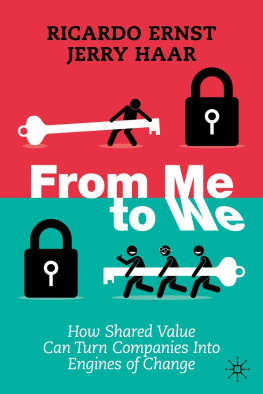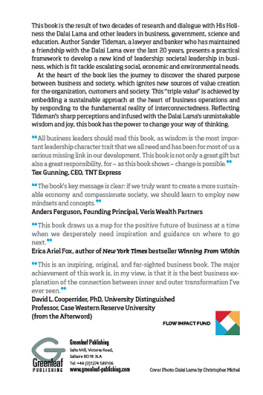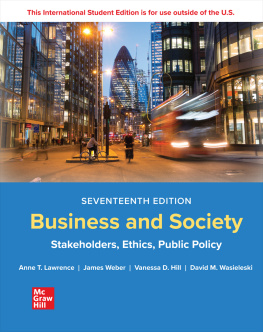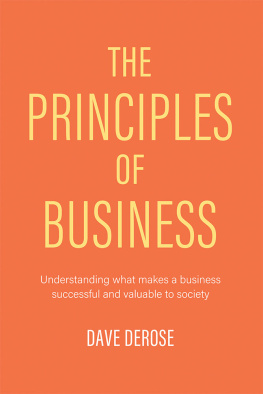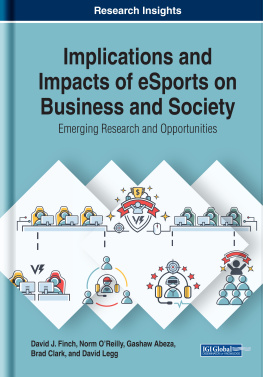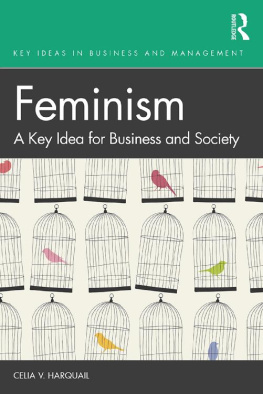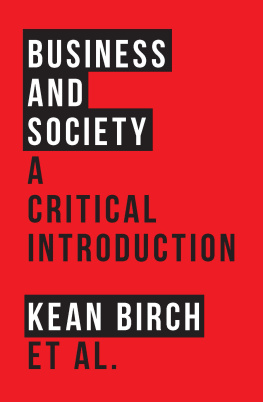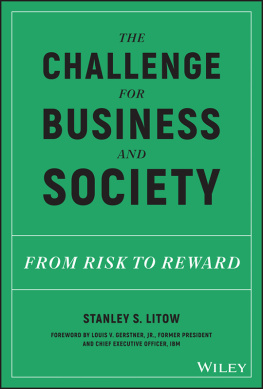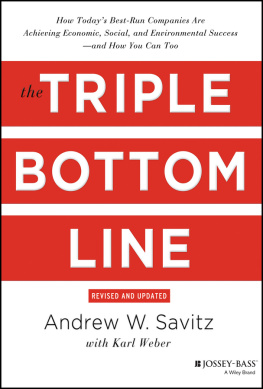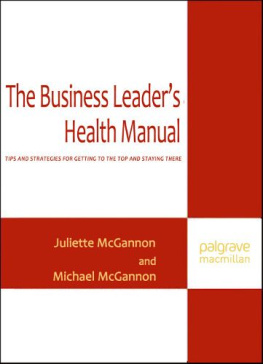MANAGEMENT AS A CALLING
LEADING BUSINESS, SERVING SOCIETY
Andrew J. Hoffman
STANFORD BUSINESS BOOKS
An Imprint of Stanford University Press
Stanford, California
2021 by the Board of Trustees of the Leland Stanford Junior University.
All rights reserved.
No part of this book may be reproduced or transmitted in any form or by any means, electronic or mechanical, including photocopying and recording, or in any information storage or retrieval system without the prior written permission of Stanford University Press.
Special discounts for bulk quantities of Stanford Business Books are available to corporations, professional associations, and other organizations. For details and discount information, contact the special sales department of Stanford University Press. Tel: (650) 725-0820, Fax: (650) 725-3457
Printed in the United States of America on acid-free, archival-quality paper
Library of Congress Cataloging-in-Publication Data
Names: Hoffman, Andrew J., 1961-author.
Title: Management as a calling : leading business, serving society / Andrew J. Hoffman.
Description: Stanford, California : Stanford Business Books, an imprint of Stanford University Press, 2021. | Includes bibliographical references and index.
Identifiers: LCCN 2020035357 (print) | LCCN 2020035358 (ebook) | ISBN 9781503614802 (paperback) | ISBN 9781503615304 (epub)
Subjects: LCSH: Social responsibility of business. | Industrial management--Moral and ethical aspects. | Industrial management--Environmental aspects.
Classification: LCC HD60 .H633 2021 (print) | LCC HD60 (ebook) | DDC 658.4/08--dc23
LC record available at https://lccn.loc.gov/2020035357
LC ebook record available at https://lccn.loc.gov/2020035358
Cover design: Kevin Barrett Kane
Typeset by Kevin Barrett Kane in 10/14 Minion Pro
To Joanne
CONTENTS
by Geoff Dembicki
TABLE AND FIGURES
FOREWORD
On September 23rd, 2019, I was part of a small group of journalists escorted into the General Assembly hall at the United Nations headquarters in New York to watch world leaders and business executives announce plans for saving the planet and its 7.7 billion human inhabitants from climate change. The event was called to address the fact that with only a decade or so left to stabilize global temperature rise at a relatively safe 1.5 degrees Celsius, humankind is releasing greenhouse gas emissions into the atmosphere at record levels. The climate emergency is a race we are losing, but it is a race we can win, Secretary-General Antnio Guterres said. But it will require fundamental transformations in all aspects of societyhow we grow food, use land, fuel our transport and power our economies.
But instead of action, I watched French president Emmanuel Macron, German chancellor Angela Merkel, Microsoft co-founder Bill Gates, New York billionaire Michael Bloomberg, and a revolving A-list of global powerbrokers fail to acknowledge the root cause of our crisis: an economic system predicated on endless profits, growth, and consumption without any regard for the consequences. The only person who seemed willing to point this out was a sixteen-year-old from Sweden. We are in the beginning of a mass extinction. And all you can talk about is money and fairytales of eternal economic growth, Greta Thunberg told the room, barely holding back tears. How dare you? If you choose to fail us, I say we will never forgive you.
Thunbergs words sounded lonely and radical. But watching her face contort with anger while the CEOs and politicians she addressed smiled nervously and applauded, I realized I was observing a central faultline of our era: a younger generation demanding radical changes to address the crises caused by our global economic system and the older people in power unable or unwilling to make those changes.
Millennials and Gen Zs are disillusioned, reads a report summarizing the data. Theyre not particularly satisfied with their lives, their financial situations, their jobs, government and business leaders, social media, or the way their data is used. Survey respondents cited climate change as their number one personal concern, followed by income inequality and unemployment. They did not appear to have much faith in the ability of business to fix these challenges or even to provide the conditions for a stable life. We have less trust in employers because so many of our parents did lose their jobs, and they had been loyal to companies, one millennial told Deloitte. We have less trust in the stock market because it crashed. And I think that a lot of us are worried that it is going to happen again.
I know this tension all too well, having graduated from journalism school in 2008, which was about the worst possible timing to embark on a new career. So bad, in fact, that Business Insider labeled the following year, The year the newspaper died. When I reached out to a magazine editor with whom Id interned to see if he knew of any jobs, I learned that hed recently quit the industry for good. On his way out the door he gave an interview claiming there was no future for journalists like me. I feel lucky, having been able to intern at a small digital outlet in Vancouver, Canada, called The Tyee and then becoming a lead reporter on climate change, freelancing for outlets such as VICE and the New York Times and writing a book called Are We Screwed? (Bloomsbury, 2017)but the feelings of precarity have never left.
It is this sense of precarity and disillusionment that lead so many twenty-and thirty-year-olds to rally behind politicians like Bernie Sanders and Elizabeth Warren, expressing support for an economy-transforming Green New Deal on climate change, demanding greater taxes on the rich, or telling public opinion researchers that theyre interested in alternatives to capitalism (even if they cant quite define what exactly those are). This is not to say that every Millennial and Gen Zer is a Molotov-hurling socialist. Many of them are simply freaked out by escalating climate chaos and Great Gatsby levels of inequality, and they are eager for bold and systemic solutions.
This is the context into which this book speaks, arguing that todays business students are in a unique position to provide those solutionsbut only if they choose to. For decades, future executives have been taught to focus on short-term material gains and not worry about who or what is collateral damage in the process. Young people now entering or enrolled in business school face immense pressure to follow in that path. But if they do, societys crises will only get worse. Which is why Andrew Hoffman thinks tomorrows business leaders should be taught to do something that previous generations rarely did: they must start thinking critically about the role of business in society, their role as a manager in guiding those businesses, and the overall system in which they will practice their craftcapitalism.
This challenge isnt just for students looking to embark on a fuller and more meaningful career than one driven solely by the pursuit of money and status. Its for the business people and leaders who are already wielding power in our society, the business schools that train them, and anyone else who cares about creating a more equitable and environmentally sustainable world for everyone. We are in the midst of turbulent and distressing times, that much is plain to see. But the book in your hands provides an invaluable guide for navigating them. I hope that you respond to this books challenge with the creativity and urgency it requires. Indeed, you must, because the future of my generation and all future generations is depending on it.


